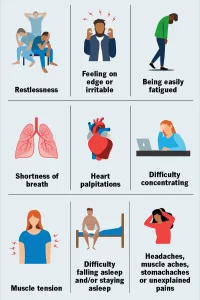Overview
Diagnosis
To diagnose generalized anxiety disorder, a healthcare professional evaluates both physical and psychological factors that could be causing or contributing to anxiety. The process may include:
-
A physical exam to identify any signs that anxiety might be linked to medications or an underlying medical condition
-
Blood, urine, or other lab tests if a medical condition is suspected
-
A detailed discussion of symptoms and medical history
-
Psychological questionnaires to help assess anxiety levels and patterns
-
Use of diagnostic criteria from the Diagnostic and Statistical Manual of Mental Disorders (DSM-5), published by the American Psychiatric Association
This thorough evaluation helps ensure that the diagnosis is accurate and that treatment addresses both emotional and physical contributors to anxiety.
Treatment
Treatment for generalized anxiety disorder focuses on reducing symptoms, improving daily functioning, and helping manage worry more effectively. The two main approaches are psychotherapy and medications, often used together for the best results.
Psychotherapy
Psychotherapy, also known as talk therapy or psychological counseling, involves working with a therapist to understand and manage anxiety. The most effective form for generalized anxiety disorder is cognitive behavioral therapy (CBT).
CBT helps you:
-
Identify and challenge negative thinking patterns
-
Develop skills to manage worries more effectively
-
Gradually return to normal activities that may have been avoided due to anxiety
This short-term, skill-based therapy often provides lasting improvement by helping you change unhelpful thought patterns and build confidence in managing anxiety.
Medications
Several types of medications can help manage generalized anxiety disorder. The choice depends on your symptoms, medical history, and how you respond to treatment.
Common medication options include:
-
Antidepressants: Selective serotonin reuptake inhibitors (SSRIs) and serotonin-norepinephrine reuptake inhibitors (SNRIs) are typically the first-line treatments. Common examples include escitalopram, duloxetine, venlafaxine, and paroxetine. These medications help regulate mood and reduce anxiety symptoms.
-
Buspirone: This anti-anxiety medication may be prescribed for ongoing use. It can take several weeks to reach full effectiveness and is often well tolerated.
-
Benzodiazepines: These fast-acting sedatives may be used for short-term relief of acute anxiety. However, they are generally not recommended for long-term use due to the risk of dependence, especially for those with a history of substance use issues.
Advertisement

